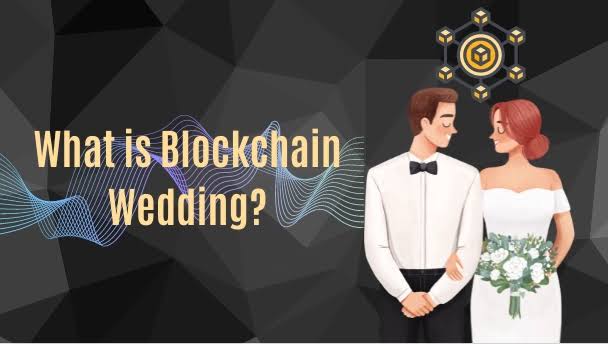A blockchain wedding is a contemporary take on a classic wedding in which the union is documented on the blockchain. This approach uses Blockchain technology’s immutable, transparent, and secure features to record the marriage contract. By doing this, the marriage certificate—a permanent record of the couple’s commitment—becomes unalterable and publicly verifiable in a digital ledger. Tech-savvy couples who respect these values will often find this concept appealing since it represents the stability and openness of the marriage. Some couples have even included the exchange of digital tokens in their vows, giving their wedding ceremony a distinctive and cutting-edge feel.
How Does a Blockchain Wedding Operate?
1. Creation of Smart Contracts: A programmer creates a smart contract, which is essentially a collection of online guidelines and directives that the couple approves of. The conditions of the marriage and, in some situations, the distribution of assets in the event of a divorce may be outlined in this agreement.
2..NFTs and Tokens: Non-Fungible Tokens (NFTs) that symbolise rings, vows, or other symbolic objects can be exchanged by couples during the ceremony. These tokens are one-of-a-kind and are kept on the Blockchain, which makes the trade permanently and publicly visible. Signing the Contract: The contract is formalised and becomes binding upon the signatures of both parties when the pair signs it using their private keys. Transparency and security are thus guaranteed.p3.Signing the Contract: The contract is officially signed by the pair using their private keys, rendering it binding on both of them. Transparency and security are thus guaranteed.
4. Transaction and Verification: The marriage is handled as a transaction by the smart contract. This is like to signing a marriage licence in that the couple affirms their commitment, and the contract then carries out the provisions that were agreed upon, like transferring NFTs. The network verifies the transaction (by mining in Proof of Work systems or validation in Proof of Stake systems) to make sure it complies with the Blockchain’s regulations and is permanently recorded.
5.Public Record: The marriage record is an immutable record that cannot be altered or removed once it is published to the Blockchain.
How does NFT marriage work?
Following an NFT marriage, a Non-Fungible Token (NFT) is created as a digital marriage certificate. Usually occurring in virtual worlds such as the Metaverse, this idea is very new. A site called Closeup, for instance, allows couples to get married virtually using their digital avatars as witnesses and issues an NFT as proof of their union.In a nonfungible token marriage (NFT) the couple mints and trades digital tokens that represent their union, frequently on platforms such as Ethereum. Digital wedding bands or vows can be incorporated into these tokens to make them uniquely yours.
Each partner has a digital wallet. After the vows are minted as an NFT, it is transferred to one partner’s wallet and then to the other’s, symbolizing the exchange of vows and commitment.
Although this form of marriage is not legally binding, it represents a symbolic commitment between partners, celebrating their relationship in a novel, digital format. This is particularly significant for couples who face legal or social barriers to marriage in the real world.
Does blockchain allow for marriages?
It’s possible to do a marriage ceremony entirely digitally on the blockchain, complete with shared digital wallet creation, marriage registration, and NFT certificate issuance. The couple’s connection is digitally acknowledged by this, but it doesn’t take the place of a formal marriage. Blockchain technology is used by platforms such as “Marriage-Chain” on GitHub to allow couples to register their marriage and manage shared bank accounts. In order to accommodate the digital element of contemporary relationships, the procedure is made to be simple.
These digital forms of marriage are gaining popularity for their innovative approach to symbolizing unions in the digital age, though they do not replace traditional, legally recognized marriages. They offer a unique way for couples to express their commitment in the ever-evolving landscape of technology.
In conclusion, Blockchain weddings are transforming the way engaged couples arrange and enjoy their special day. Couples can have more secure and customised wedding experiences by utilising this technology. Future weddings may find that Blockchain is a popular option as more people become aware of its advantages.


